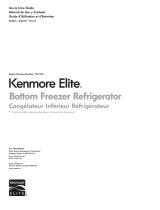
CONNECTING THE WATER SUPPLY
WARNING
Connect to safe drinking water supply
• The water pressure must be between 21 and
121 p,sJ, (1,5~8,5 kgficm =)on models without a
water filter and between 43 and 121 ps,i,
(3~8.5 kgf/cm _) on models with a water filter.
• If water pressure does not reach 21 psi
(1,5kgficm 2)or falls below, it is necessary to
purchase a separate pre_ure pump for normal
automatic icemaker and water dispensing
operation,
• It is recommended that the total length of the
water feed tube does not exceed 26 ft. (8 m).
• Install the water supply line where it will not be
affected by heat,
• If a reverse osmosis water filtration system is
connected to your cold water supply, This water
line installation is not warranted by the refrigerator
or icemaker manufacturer. Follow next instructions
carefully to minimize the risk of expensive water
damage.
• If a reverse osmosis water filtration system is
connected to your cold water supply, the water
pressure to the reverse osmosis system needs to
be a minimum of 40 to 60 psi (2,8 kgficm 2--
4.2 kgf/cm% less than 2.0~3.0sec to fill a cup of 7oz
capacity),
• If the water pressure from the reverse osmosis
system is less than 21 psi (1.5 kgf/cm =,more than
4.0sec to fill a cup of 7oz capacity):
• Che_ to see whether the sediment filter in the
reverse osmosis system is blocked. Replace the
filter if necessary.
• Allow the storage tank on the reverse osmosis
system to refill after heavy usage.
• If the issue about water pressure from reverse
osmosis remains, call a licensed, qualified plumber,
IMPORTANT: Read all directions thoroughly
before you begin.
• If operating the refrigerator before installing the
water connection, turn the icemaker to the OFF
position to prevent operation without water,
• All installations must be in accordance with local
plumbing code requirements.
• Use copper tubing and check for leaks,
• Install tubing only in areas where temperatures
will remain a_ve freezing.
• It may take up to 24 hours for the icemaker to
begin producing ice.
Tools Required
• Standard screwdriver
• 7/1Gin and 1/2-in open-end wrenches or two
adjustable wrenches
• 1/4-in. nut driver
• 1/44n, drill bit
• Hand drill or electric drill (properly grounded)
NOTE: Refrigerator dealers offer a kit with a 1!4-in.
saddle-type shutoff valve, a union, and copper
tubing. Before purchasing, make sure a saddle-
type valve complies with local plumbing codes
Do not use a piercing-type or 3/1_in, saddle
valve which r_uces water flow and clogs more
NOTE: The Commonwealth of Massachusetts
Plumbing Code 248CMR shall be adhered to.
Saddle valves are illegal and use is not permitted in
Massachusetts. Consult with your licensed plumber.
Cold water Supply
• The icemaker water valve contains a flow washer
which is used as a water pressure regulator.
• The icemaker needs to be connected to a cold
water line with water pressure between 21 ~121
psi (1.5--8,5 kgflcm 2)on models without a water
filter and between 43 and 121 p.s.i. (3--8.5kgf/cm 2)
on models with a water filter.
18
CONNECTING THE WATER LINES
IMPORTANT: Before connecting the tubing to
the water line, unplug the refrigerator or
disconnect the power,
• Turn off the main water supply and open the
nearest faucet to relieve pressure in the line,
Opening an outside faucet may help drain
water from the line in the house,
• Find a 1/2oin, vertical COLD water pipe near
the refrigerator,
NOTE: A horizontal pipe wili work, but the
following precaution must be taken: drill on the
top of the pipe, not the bottom. This wil help
keep water away from the drill and also keep
normal sediment from collecting in the valve.
• To determine the length of copper tubing you
will need, measure from the connection on the
lower left rear of the refrigerator to the water
pipe, Add 7 ft (2.1 m) to allow for moving the
refrigerator for cleaning, Use 1/4-in. O.D.
(outside diameter) copper tubing. Be sure both
ends of the copper tubing are cut square
• Using a drill, drill a 1!4-in. hole in the cold water
pipe you have selected.




















